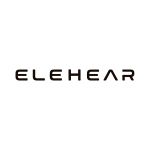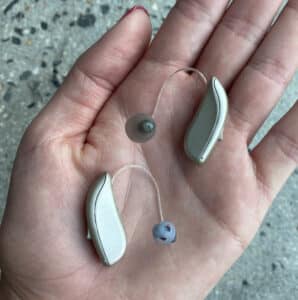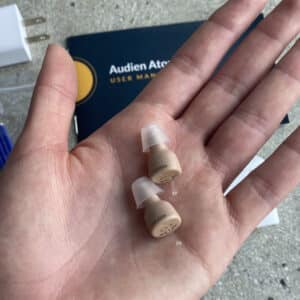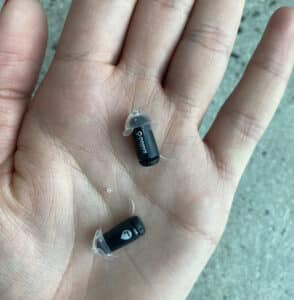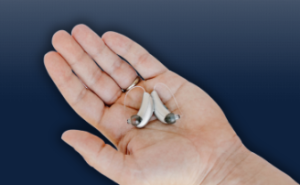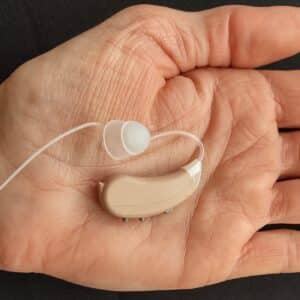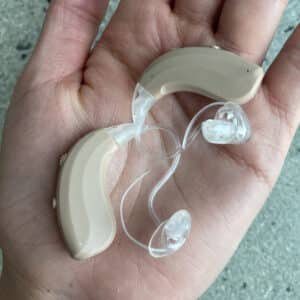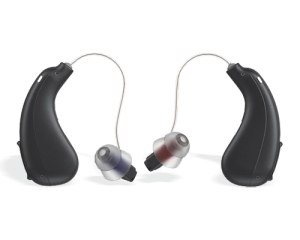We chose Jabra Enhance as the “Best Overall” due to its long warranty, reputation for good customer support, and devices that offer a package of easy-to-use features. We also found the app easy to use for making adjustments to the volume and listening settings, which wasn’t the case for every hearing aid we tested.
7 Best Over-the-Counter (OTC) Hearing Aids of 2024
Did you know your hearing health is important to your overall wellness? Research shows that hearing loss can lead to a host of other health problems, such as depression, falls, and even early dementia. [1]Bigelow RT, et al. Association of Hearing Loss With Psychological Distress and Utilization of Mental Health Services Among Adults in the United States. Journal of the American Medical Association (2020). Found on the internet at https://www.ncbi.nlm.nih.gov/pmc/articles/PMC7372323/ The good news is that over-the-counter hearing aids can not only help you hear better, they can also help prevent some of those conditions, improving brain function and your quality of life. [2]Desjardins, JL. Analysis of Performance on Cognitive Test Measures Before, During, and After 6 Months of Hearing Aid Use: A Single-Subject Experimental Design. American Journal of Audiology (2016). Found on the internet at https://pubs.asha.org/doi/10.1044/2016_AJA-15-0067
But hearing aids are an expensive purchase, making it difficult for many Americans to get treatment for their hearing loss. On Oct. 17, 2022, the U.S. Food and Drug Administration (FDA) took a big step toward increasing access to hearing aids for millions of Americans by making over-the-counter (OTC) hearing aids available for sale nationwide. [3]The White House. Statement by President Joe Biden on FDA Hearing Aids Final Rule. Found on the internet at https://www.whitehouse.gov/briefing-room/statements-releases/2022/08/16/statement-by-president-joe-biden-on-fda-hearing-aids-final-rule/
What exactly are OTC hearing aids, and how can you buy them? Read our review of the best OTC hearing aids to find out how much they cost, where to buy them, and what to consider before purchasing. For information on both OTC and prescription hearing aids, read our review of the best hearing aids of 2024.
A quick look at the best OTC hearing aids of 2024
- Jabra Enhance: Best for Seniors
- Audien: Best Price
- Eargo: Best Invisible Fit
- Audicus: Most Comfortable
- Lexie: Most User-Friendly
- MDHearing: Best Remote Customer Service
- ELEHEAR ALPHA Pro: Best for Travel
Comparison of the best OTC hearing aids as of November 2024
| Price per pair | $799–$1,995 | $99–$489 | $799–$2,950 | $1,398-$1,998 | $799–$999 | $297-$699 | $459-$579 |
| Battery Life | 12–30 hours | 20–24 hours | 9-16 hours | Up to 16 hours | 18 hours | 16–20 hours | Up to 20 hours |
| Bluetooth | Yes | No | Yes on the Link only |
Yes (not available for the Mini) | Yes adjustments only, no streaming; iPhone call streaming through B2 model only |
Yes adjustments only on Volt Max, no streaming |
Yes |
| Warranty | 3 years | 1 year | 1–2 years | 2 years | 1 year | 1 year | 1 year |
| Financing | Yes | No | Yes | Yes | No | Yes (Volt Max) | Yes |
Best OTC hearing aids review
Our expert take on Jabra
Jabra Enhance OTC are quality hearing aids that can be remotely adjusted by the Jabra Enhance audiology team to fit your hearing profile. Jabra offers three OT devices: the Enhance Select 500, the Enhance Select 300, and the Enhance Select 50R. The most affordable option is the Jabra Enhance 50R, a behind-the-ear hearing aid with a rechargeable battery that costs $995 per pair.
The biggest difference between the top two models is that the Enhance Select 500 has low-energy audio and the most advanced hearing technology Jabra offers for a natural hearing experience in complex situations, like a crowded area. All models include hands-free calling with iPhone 11 and newer, so you can take phone calls with your hearing aids by connecting them to your phone with Bluetooth. The newest model includes hands-free calling with Android as well.
The Enhance Select 500 and 300 have a 30-hour battery life, longer than any other OTC brand we’ve found. Every model, including the recently updated Enhance Select 50R, comes with rechargeable batteries, something 21% of our hearing aid survey respondents said was the No. 1 feature they wanted in a hearing aid.
Jabra Enhance offers a free online hearing screening to help determine your degree of hearing loss. To learn more, read our full Jabra hearing aids review.
Our expert take on Audien
The three Audien models are all FDA-registered and small in-the-canal hearing aids with a rechargeable battery. None have Bluetooth capabilities or advanced sound processing features like directional microphones, noise reduction, or the ability to be customized to fit your type of hearing loss.
Audien also offers only one listening profile, and in testing, we were surprised to find that a small screwdriver is needed to change the volume of the Atom model. A black screwdriver/brush hybrid tool is included with your purchase, but it’s not a convenient or discreet way to adjust the volume.
We also found that the user manual was brief compared to other brands we tested; detailed instructions are only available through videos Audien posts on YouTube. Still, if price is your main consideration, as it is for many people with hearing loss, Audien could be a great place to start.
Learn more about Audien from our Audien hearing aids review.
Our expert take on Eargo
We liked the variety of tips and domes Eargo provided with the hearing aids we tested (see Figure 1), allowing users to find the fit most comfortable for them.
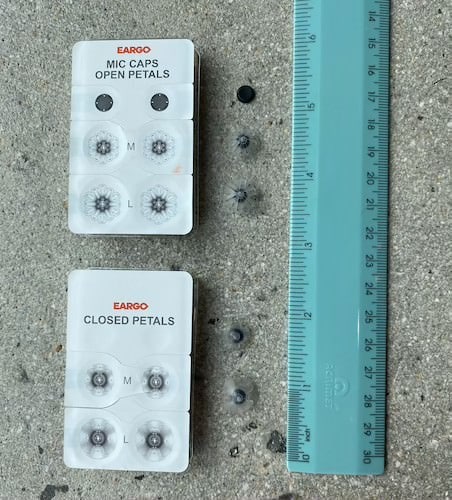
We talked with Brian Murray, a hearing instrument specialist in Raleigh, North Carolina, who cautioned that people with certain types or degrees of hearing loss might need a BTE or RIC-style hearing aid rather than an ITE or CIC-style.
*These are self-fitting models, so settings can also be customized to your preferences using the Eargo app
You can use the Eargo mobile app to make adjustments and schedule remote support with an Eargo hearing specialist thanks to Bluetooth connectivity, but the hearing aids are too small to include the technology needed for streaming phone calls, music, or TV.
Eargo 7 features Sound Adjust+ with Clarity Mode, which makes automatic sound adjustments as you move between environments for a clearer listening experience compared with the Eargo 6. The splash- and sweat-resistant LINK by Eargo is the first of the Eargo line to feature Bluetooth phone and music streaming, making it a good choice for active users.
To learn more, read our full Eargo hearing aids review.
Our expert take on Audicus
We chose the Audicus Omni as the most comfortable, over-the-counter hearing aid available, particularly for those who want to wear their hearing aids for several hours. One of the major highlights of the Omni is its highly discreet behind-the-ear (BTE) design, which is rare in a BTE model. Testers found that it remains comfortable in the ear, even after extended periods of use, making it a great option for those who need hearing aids for all-day wear.
Setting up the Audicus Omni is pretty straightforward, thanks to its intuitive app that lets the user adjust settings like volume, clarity, and environment-specific hearing programs. The device’s built-in program lists make it easy to adjust to different surroundings. The app also tracks battery percentage and average wear time.
The charging process was also simple, as clear LED indicators show the battery’s status as it charges. The Omni also comes with a desiccant capsule, which helps dry out the hearing aids while they charge.
Our testing team was impressed with the Audicus Omni’s balance of comfort and helpful features. To learn more, read our full Audicus hearing aids review.
Our expert take on Lexie
If you’re new to hearing aids or aren’t comfortable using technology, look into the Lexie Lumen, which has the same hearing technology as the B1 and B2 Plus. This model comes with six listening profiles to choose from, or you can take a hearing test using the app, which will automatically adjust your Lumen hearing aids based on the results of your test. You don’t have as much control over small adjustments, but the app does more of the work for you, making it a great choice for someone who’s new to hearing aids.
Another feature offered only in the Lumen is a telecoilⓘ A telecoil is a small copper wire built into a hearing aid that allows you to connect to a phone or loop system to bring audio directly to you. Loop systems are commonly found in theaters, places of worship, and public transportation. , also known as a T-coil or T-switch. Telecoils work with assistive listening technology (called induction loop systems) in other sound equipment to help you hear more clearly. When activated in the hearing aid, the telecoil routes sounds directly to your hearing aids without the need for Bluetooth pairing.
While the Lumen and B1 models only offer Bluetooth connectivity to access the app for making adjustments, the B2 Plus also allows you to stream phone calls from an iPhone.
*While Lexie doesn’t offer a traditional financing option, the company does have a subscription plan. With a security payment and monthly fee, you can pay off your hearing aids over a 24-month period. You’ll end up paying $358–$426 more for your hearing aids with the subscription plan compared to buying them upfront, but this may be a good option if you need to spread your payments out over time.
Learn more in our full Lexie hearing aids review.
Our expert take on MDHearing
We talked with Stefanie Godbey, AuD, an audiologist at Ohio Hearing and Audiology. She says that in recent years, she’s seen more patients who want to learn about hearing health, which helps her better meet their needs.
“People are now asking us better questions, and they want to be part of the journey, and that really helps a lot of patients because they’re engaged in the process. When you have a patient who’s engaged, that makes it a lot easier on both ends to focus on the common goal.”
From our hands-on testing, mystery shopping, and real-world purchasing experiences, we’ve found that the audiologists at MDHearing work hard to help their customers meet their hearing goals and have a successful experience. Not all OTC companies offer unlimited remote support, so this is a benefit worth looking for.
The Volt Max is an FDA-approved, self-fitting hearing aid that can be adjusted with the MDHearing app to match your hearing loss profile. [4]
Both the Volt and Volt Max provide four listening settings and dual-directional microphones to help you hear and understand conversations in front of you. By comparison, Audien only offers one listening profile, no app capability, and no directional microphones.
The NEO and NEO XS (which is 50% smaller than the NEO) are too small to accommodate directional microphones, but they both feature noise reduction and rechargeable batteries that last 17 or 18 hours (or longer) per charge, respectively.
Learn more through our full MDHearing aids review.
Our expert take on ELEHEAR
Overall, our testing showed the ELEHEAR Alpha Pro hearing aids provide high-end features and fit for an affordable price. We appreciated the seamless setup, comfortable fit, and useful Bluetooth and app features for customizing each hearing aid (each side can be customized independently).

From our ELEHEAR tester
“The device generally fits very comfortably in my ear. For the price, I think it looks very high-end! I had no issues getting it in place and it feels very secure. I shook my head and it did not budge. Seems like a great size. Not as discreet as some ITEs but is very slim and I could wear it with glasses with no problem!”
ELEHEAR’s Alpha Pro offers some unique features we found helpful. For instance, a raised toggle on the hearing aids improves accessibility, and the comprehensive user manual ensures a smooth experience for new users. Our tester also liked the wax guard-changing device that accompanies the hearing aids to help keep them clean. The device is a wheel with removable inserts and a wire brush for cleaning. “The domes appear pretty durable and are easy to remove and replace,” our tester explained.
For audio use, there are four different modes on the ELEHEAR Alpha Pros:
- General mode
- Restaurant mode
- Outdoor mode
- TV mode
To switch modes, press the volume button directly on the hearing aid until you receive verbal confirmation. The volume button also serves as the power on/off button, which our tester notes can be “easy,” but there could be disadvantages if you prefer a hearing aid with separate buttons so there’s no confusion. “I did find there was a tiny bit of a learning curve to adapt to how the buttons reacted but once I did it was straightforward,” the tester added.
The ELEHEAR app offers additional audio adjustments and customization. For instance, the app allows you to change the volume of each side of the hearing aid, see the battery of each device, change the noise reduction from mild to strong, mute and unmute, change the speech focus (directional hearing) from forward-facing to 360 degrees, and switch between the four programs on the device.
There’s a specific menu in the app to adjust each hearing aid. Our tester found some settings challenging in determining what she needed, as users can choose between mild, mild-to-moderate, moderate I, and moderate II hearing loss in each ear. The mild hearing loss settings also allow for further fine-tuning of settings, including the following presets:
- Ocean Wave (low, male voice, engine roar)
- World sound (speaking voices, TV, and radio)
- Birds chirping (high-pitched melody, phones ringing)
Our tester found the names of the presets “confusing” but did appreciate that once you adjusted the settings in the app, it would auto-save it and create custom programs as well.
Last but not least, our tester described the charging of the hearing aids as “very easy and straightforward,” thanks to the generous length of the charging cable and the magnetized charging ports and cradles in the hearing aid case.
Brands that didn’t make our best OTC hearing aid list
We chose the top seven OTC hearing aid brands through research and mystery shopping. Find out which others were top contenders but didn’t make our list and why.
- Nuheara HP Hearing Pro: HP Hearing Pro rechargeable Bluetooth hearing aids are self-fitting, FDA-cleared, ITE earbud-style OTC devices manufactured by Nuheara. Sony and HP Hearing Pro were close competitors for our “Best Earbud-Style” hearing aid. Sony outperforms in battery life with up to 26 hours, while the HP Hearing Pro only offers eight. If you stream music or calls to your HP devices, you’ll reduce the battery life to five hours.
- LumiEar: LumiEar OTC hearing aids are available online in three rechargeable models: the BTE LumiCharge V3 ($297 per pair) and V4 ($397 per pair), and the ITC LumiMini V3 ($349 per pair). Both OTC models have Bluetooth technology for in-app sound adjustments, but the LumiMini V3 is the only model with streaming capabilities for hands-free calling. LumiEar doesn’t list any warranty on its site, and its 30-day trial period is shorter than many other brands.
- Neptune: The Neptune Hearing website advertises two OTC rechargeable hearing aid models. The XL-1 is an ITE-style device listed at $297.99 per pair, and the VH-23 is a BTE-style device listed at $198.99 per pair. Neither have Bluetooth capabilities, but they do claim to have tinnitus-masking technology.
- Nano: Nano rechargeable OTC hearing aids come in BTE and CIC styles for $297–$597 per pair. The Nano Sigma Plus model ($597) is the only one that offers Bluetooth connectivity to an app for wireless adjustments. This brand’s price range is lower than most, but Nano was involved in a lawsuit over false advertising for “implying its products are approved by the FDA when they are not,” among other misleading business practices.
- Nebroo: Nebroo hearing aids raised some red flags for us due to their lack of transparency, vague product information, and aggressive marketing tactics. Based on our research, the company’s newness and inconsistent policies make it a risky choice. We recommend choosing a more established brand with clear product details and more straightforward business practices.
New OTC hearing aid technology
The latest Apple AirPods Pro 2 release will feature the newest hearing aid technology integrated into Bluetooth headphones. Using Apple AirPods as hearing aids may reduce some of the stigma around hearing loss while introducing new technology and an easy way to use your hearing support device with your other Apple products. These new AirPods will include a hearing test, hearing aid feature, and hearing protection—what the company describes as “the world’s first all-in-one hearing health experience”—as part of the free software upgrade, which is scheduled to automatically update in late October 2024. The headphones will also have new hearing protection capabilities, such as loud sound reduction, that will activate automatically.
The NCOA team will test the new AirPods Pro 2 as soon as the new software rolls out. Though we don’t believe these new AirPods will function the same way other hearing aids do, they may bridge the gap for those who could use hearing assistance but aren’t ready for a hearing aid.
How we tested the best OTC hearing aids
Our testing process for over-the-counter hearing aids is designed to provide our readers with the information they need to make the best purchasing decisions. We start with extensive research, consulting with audiologists and geriatric care experts to ensure we deeply understand hearing aids and those who rely on them. We also review thousands of customer reviews from trusted sites like Better Business Bureau and Trustpilot.
Gathering insights from these sources has given us a complete view of how hearing aids perform in the real world.
We then conduct a detailed survey of over 300 hearing aid users to capture direct feedback on features, challenges, and overall satisfaction. Our analysis is based on several weighted factors: price, user experience, features, customer support, and reputation. Lastly, we bring each hearing aid into our offices and personally test them so we understand how they fit, work, and feel.
For more information about how we tested over-the-counter hearing aids, read our methodology.

We’re constantly researching and testing new hearing aids to bring you the most recent information possible. Check back regularly for new updates.
What are OTC hearing aids?
OTC hearing aids are FDA-regulated medical devices that can be bought directly from the manufacturer. You don’t need a hearing exam, prescription, or appointment with an audiologist to purchase OTC hearing aids.
OTC hearing aids are designed and best for people who:
- Are age 18 and older with perceived mild to moderate hearing loss
- Do not require a prescription or monitoring from a licensed hearing health professional
- Can comfortably complete a hearing loss self-assessment
- Will be able to independently control their hearing aid settings and software without assistance
According to the FDA’s final rule on OTC hearing aids passed in August 2022, this class of devices is appropriate for people over the age of 18 with perceived mild to moderate hearing loss. [8] U.S. Food and Drug Administration. FDA Finalizes Historic Rule Enabling Access to Over-the-Counter Hearing Aids for Millions of Americans. Found on the internet at https://www.fda.gov/news-events/press-announcements/fda-finalizes-historic-rule-enabli
How much do OTC hearing aids cost?
OTC hearing aids range in price from $99 per pair to more than $3,000 per pair. Basic hearing aids with less audiology support and fewer features are often cheaper than those with more tech-forward sound enhancements and in-depth customer care. The average price is expected to come down, though, as more manufacturers enter the market.
The federal government estimates Americans can expect to save up to $3,000 per pair compared to the average price of prescription hearing aids. [3]The White House. Statement by President Joe Biden on FDA Hearing Aids Final Rule. Found on the internet at https://www.whitehouse.gov/briefing-room/statements-releases/2022/08/16/statement-by-president-joe-biden-on-fda-hearing-aids-final-rule/
Our survey of 600 hearing aid users found that cost was a major factor in respondents’ buying decisions. Price ranked as the second-most important factor when customers were deciding which hearing aid to buy, right behind ease of use.
Do Medicare or Medicaid cover over-the-counter hearing aids?
While Medicare A and B do not cover the costs of hearing exams, hearing aids, or hearing aid supplies, some Medicare Advantage plans do. Check with your insurance provider to see if your plan includes hearing coverage, including hearing aids. You can also use NCOA’s BenefitsCheckUp to see what other benefits you may qualify for.
6 ways to save money on OTC hearing aids
Look at the following six ways to save money when you’re buying OTC hearing aids:
- Watch for sales: Hearing aid companies run seasonal and holiday-related sales frequently. Once you’ve decided which brand and model you want to buy, check the website or retail store the week of a holiday to see if you can take advantage of a sale.
- Match prices: Hearing aid manufacturers usually won’t match another brand’s prices because each brand and model is unique. But with OTC hearing aids now sold in retail stores, you can often ask one store to match another store’s lower price if you find the same brand and model at two different stores.
- Search for discounts and financial assistance: In most cases, Medicare doesn’t cover the cost of hearing aids, but you may be eligible for reduced-price or free hearing aids through other organizations. Some insurance companies give hearing aid allowances, and certain state Medicaid programs may cover some or all of the costs associated with hearing exams and devices. [5]Hearing Loss Association of America. Medicaid. Found on the internet at https://www.hearingloss.org/hearing-help/financial-assistance/medicaid/
- Take advantage of payment plans: Most OTC and prescription hearing aid companies offer financing plans if you prefer paying a smaller amount each month rather than paying the full cost up front.
- Use veterans hearing aid benefits: U.S. veterans can receive hearing exams, hearing aids, and hearing aid supplies free of charge if they are eligible for VA health care. Check with your local VA office to find out what benefits you have. [6]
- Use HSA or FSA: Both health savings accounts and flexible spending accounts can be used to pay for OTC hearing aids.
For more money-saving tips and to find budget hearing aids, read our review of the most affordable hearing aids.
What to look for in an over-the-counter hearing aid
How do you decide which of the best non-prescription hearing aids will meet your needs? After 5,300 hours of research, our Reviews Team made a list of the best expert shopping advice they had to give on several important points. Here’s what to look for.
Style
OTC hearing aids are available in a variety of designs, from in-the-ear (ITE) to receiver-in-canal (RIC) and behind-the-ear (BTE) styles.
This is the starting point for many people when thinking about which hearing aid is best for them. Not only for how it looks, but for how it feels in the ear. It’s important to buy a hearing aid that’s comfortable since you’ll be wearing it for eight or more hours every day.
Features and technology
OTC hearing aids come in a wide range of models, from very basic devices to advanced hearing instruments that can be personalized to your hearing profile. It can be tempting to buy the most high-tech hearing aids available, but consider which features you’ll use before paying for them.
For instance, are you looking for OTC hearing aids with Bluetooth? The volume and settings on Bluetooth hearing aids can be adjusted using a smartphone app, but some people prefer making adjustments with buttons or dials on the hearing aid itself. Do you want hands-free calls? Some Bluetooth hearing aids can stream audio from your phone.
Also, consider your lifestyle. If you spend most of your time at home, in quiet environments, or in small groups of friends and family, a more basic and affordable hearing aid like Audien or Lexie or the least expensive MDHearing models may be fine for your needs.
But if you’re often in noisy environments that present listening challenges, you may want a higher-end device with more advanced sound processing abilities and options for customization to your hearing needs in each environment. Brands like Jabra Enhance, Eargo, and Lexie offer some of the best over-the-counter hearing aids with higher-end technology.
Customization
Over-the-counter hearing aids are available as preset or self-fitting devices. A preset hearing aid is pre-programmed when the user receives it, allowing them to choose from a handful of programs or adjust the volume. While these hearing aids tend to be easier to use and more affordable, they’re not as customizable to the environment or user needs. A self-fitting device allows the user to adjust the settings in a Bluetooth-connected app, which allows them to make changes until they find the exact settings that work best for them. These are highly customizable, but they tend to be more expensive and a little more difficult to use.
Battery type
Are you interested in disposable or rechargeable batteries? You’ll pay several hundred dollars more for rechargeability in most cases, but you may find the convenience is worth the extra cost.
Trial period
Because most OTC hearing aids don’t come with the option of seeing an audiologist in person for adjustments and support, it’s important to look for a brand offering a trial period to allow you time to make sure the hearing aids fit well and help with your hearing loss.
Most states require hearing aid dispensers to provide a trial period. To view a list of each state’s requirements, see the Hearing Loss Association of America.
Warranty
Warranty length is also important, as hearing aids are complex electronic devices. You’ll want to find out not only how long the standard warranty is but also what it covers. Among OTC hearing aids, a one-year warranty covering manufacturer defects is common.
Some manufacturers include loss, damage, or wear and tear in their standard warranties. Jabra Enhance is a good example, with a three-year manufacturer’s warranty and three years of coverage for loss and damage.
Other brands provide a short and/or limited warranty, with the option to purchase extended warranty coverage. MDHearing and Lexie both offer this type of coverage.
Take a look at Table 1 at the beginning of this review to compare the warranty lengths of every brand.
Brand reputation
New manufacturers are emerging constantly in the rapidly changing OTC hearing aid market. Consumers need to know how to spot reputable companies and avoid handing their money over to those making false claims or selling devices that aren’t true hearing aids.
One of the best ways to find out if a company is registered with the FDA is to search the FDA establishment registration and device listing, which includes medical device registrations. [7]U.S. Food and Drug Administration. Devices@FDA. Found on the internet at https://www.accessdata.fda.gov/scripts/cdrh/devicesatfda/index.cfm
It’s also important to read independent customer over-the-counter hearing aid reviews of any devices you’re interested in buying. Don’t take the company’s word for their reputation; check out sites like the Better Business Bureau (BBB) and TrustPilot to see what others have to say.
Read about ways to avoid OTC hearing aid scams for more information.
We interviewed Jacquelyn C. J. Lovitt, Au.D., co-founder of Capital Institute of Hearing and Balance in Silver Spring, Maryland, to learn more about OTC hearing aids.
“Early intervention is key for the long-term health of your auditory system, [but] is often one of the last on folks’ health care checklists,” said Amy Sapodin, a doctor of audiology in New York City.
“The new category of OTC hearing devices is intended to increase accessibility and awareness for the need to treat hearing difficulty in its early stages, not just when it’s unlivable. It will also remove barriers to access for those who cannot afford prescription hearing aids.”
Where to buy OTC hearing aids
You can buy OTC hearing aids online and in stores that carry health care devices, such as Walgreens, Best Buy, and Walmart. Look for them in the pharmacy section. Some audiologists sell over-the-counter hearing aids. You also have the option to see these healthcare professionals for a hearing test and then use your results to purchase an over-the-counter hearing aid online or in-store, instead of directly from the audiologist.
FDA Regulation of OTC Hearing Aids
The FDA has developed a set of regulations that apply to all OTC hearing aids in order to ensure their safety for adults with mild to moderate hearing loss. [9]Federal Register. Medical Devices; Ear, Nose, and Throat Devices; Establishing Over-the-Counter Hearing Aids. Found on the internet at https://www.federalregister.gov/documents/2022/08/17/2022-17230/medical-devices-ear-nose-and-throat-devices-establishing-over-the-counter-hearing-aids These regulations outline details like how OTC hearing aids can be labeled, the degree to which they can magnify sounds, and how far they can be inserted in the ear.
The FDA has certain guidelines when it comes to the certified labeling on OTC hearing aid packaging. The most noticeable is the box that warns against the use of hearing aids for those younger than 18. Additional label requirements enforced by the FDA include:
- Perceived symptoms of mild to moderate hearing loss
- When to seek help from a hearing health professional
- “Red-flag” conditions requiring a doctor’s attention
- Manufacturer’s contact information
- Information on the manufacturer’s return policy
- Whether the hearing aids are used or rebuilt
- What is needed to control the settings and customize the hearing aids to the user’s needs (e.g., mobile phone app or remote control)
You may see labels on hearing aids regarding their FDA-certified registration, approval, or clearance. Products registered with the FDA have listed their manufacturing facility and provided information about their manufacturing process. FDA registration does not mean the FDA has tested a product or deemed it safe. [10]U.S. Food and Drug Administration. Are There “FDA Registered” or “FDA Certified” Medical Devices? How Do I Know What Is FDA Approved? Found on the internet at https://www.fda.gov/medical-devices/consumers-medical-devices/are-there-fda-registered-or-fda-certified-medical-devices-how-do-i-know-what-fda-approved
Hearing aids that have received 510(k) FDA approval or are labeled as FDA-cleared have completed a more rigorous process than those that are only FDA-registered. FDA registration applies to the facility that makes the devices, while FDA clearance or approval applies to the devices themselves.
You can report any injuries or malfunctions with your over-the-counter hearing aids to the FDA using the online MedWatch form or by calling 1-800-FDA-1088. It’s important to promptly provide this information to the FDA after the occurrence. Reportable events may include irritation in the ear canal or the skin around the ear, injuries caused by the device (like a burn from an overheated battery), the device becoming stuck in the ear canal, or a sudden worsening of hearing loss after using the device.
Who are OTC hearing aids for?
Because they need to be self-fitted and self-adjusted, over-the-counter hearing devices are best for adults over the age of 18 who are comfortable with:
- Using technology
- Making adjustments on their own
- Cleaning and maintaining their own devices
- Communicating with remote audiology support
We spoke with Frank Lin, M.D., director of the Cochlear Center for Hearing and Public Health at Johns Hopkins University in Baltimore, Maryland. He noted that different people have different needs when it comes to hearing loss treatment.
“In treating hearing loss, there is technology and there are services. They’re two different things. For example, I can think of many of my patients in their seventies and eighties who theoretically could benefit from an OTC hearing aid, but they’re still going to need the assistance of an audiology or other health professional to help guide, counsel, and educate them.
“And I have other people, who are probably younger, who could get an OTC hearing aid and be fine. They don’t need my help or another audiologist’s help.”
Hearing aids are not always the appropriate treatment for hearing loss. Sometimes other issues need to be addressed before you start using a hearing aid. A hearing care specialist has the equipment to determine your level of hearing loss better than an online hearing test can and will physically examine your ears and go over your medical history to rule out any other problems, such as:
- Sudden change or loss of hearing
- Injury to the head or ear
- Pain or discomfort in or around the ear
- Fluid, blood, or pus in the ear
- Tinnitus, a ringing sound in one or both ears
- Earwax buildup or other obstructions in the ear
Potential side effects of OTC hearing aids
It’s normal to go through an adjustment period when you get new hearing aids. The brain needs time to get used to hearing all the sounds it’s been missing, which can be surprisingly exhausting for some people. Some hearing aid side effects you may experience can include:
- A sore ear where the hearing aid sits
- Irritated skin or itching inside your ear canal
- Tinnitus
- Anxiety
- Headaches
- Loud feedback sounds from the device
Since you’re not required to see a hearing professional when you buy OTC hearing aids, you may experience some of the above side effects due to improper placement of the hearing aid in your ear, or an ear dome that is too big or too small, among other things. You may also have an underlying health issue that can’t be treated with hearing aids and will instead need to be addressed by a doctor.
What hearing aid is best for my level of hearing loss?
People with mild to moderate hearing loss are the best candidates for OTC hearing aids. For those who have a higher than moderate level of hearing loss, it’s best to consult a hearing professional before purchasing OTC devices.
Here are the four degrees, or levels, of hearing loss:
- Mild hearing loss: You have a hard time hearing soft sounds, like whispers, but can hear most normal speech unless you’re in a noisy or crowded environment.
- Moderate hearing loss: You have trouble hearing normal levels of speech and miss a lot of what’s being said. It may seem to you that people are mumbling.
- Severe hearing loss: You cannot hear others talking at normal levels but are able to hear some sounds that are loud, like lawnmowers.
- Profound hearing loss: You cannot hear any speech but can hear sounds that are very loud, like construction noise.
OTC vs. prescription hearing aids
| OTC hearing aids | Prescription hearing aids | |
|---|---|---|
| Regulated by FDA | Yes | Yes |
| Levels of hearing loss covered | Mild to moderate | Mild, moderate, severe, and profound |
| Average price | $1,600* | $4,600 |
| Hearing exam required? | No | Yes |
| Prescription required? | No | Yes |
| Fitting appointment required? | No | Yes |
| Purchasing options | In retail stores, online, and in some hearing care clinics | Hearing care clinics |
Over-the-counter hearing aids pros and cons
While OTC hearing aids are an exciting opportunity for more people to have access to affordable hearing aids, they can have drawbacks compared to prescription hearing aids. Let’s look at the pros and cons of OTC hearing aids.
Pros
- Cost: OTC hearing aids are less expensive than prescription hearing aids, and due to increased competition, the price is expected to drop even more.
- Availability: OTC hearing aids are available online and in a few stores that carry health care devices. Retail chains that sell OTC hearing aids include Walmart, CVS, and Walgreens.
- Ease of use: OTC hearing aids are designed to be adjusted by the user. Manufacturers have made them easy to use right out of the box with clear instruction manuals, volume dials, and program settings that can be adjusted directly on the hearing aids—or in a smartphone app for some models. Our Reviews Team found that nearly every brand was easy to set up and use without professional assistance.
Cons
- Limited in-person care: If you’re new to hearing aids or don’t feel at ease using technology, the lack of in-person care by a hearing specialist could be a drawback. Every brand except Audien offers remote support from audiologists or other hearing specialists, and you can also call or email your hearing aid manufacturer for help. But remote support doesn’t give you the option of having your hearing aid fitted in person with a specialist.
- Fewer features: Because OTC hearing aids are less expensive than prescription hearing aids, they don’t include the most advanced hearing technology some top-of-the-line brands do. For instance, prescription brand Oticon uses machine learning to teach the hearing aid which sounds you hear most often and adjust itself accordingly. You won’t find that type of technology in an OTC hearing aid, but many people find they still have a high level of success with simpler OTC devices. If you have a specific type of hearing loss, such as one-sided hearing loss or tinnitus, you may need a more personalized prescription device.
- Not appropriate for all levels of hearing loss: Remember that OTC hearing aids are only approved for use in adults with mild to moderate hearing loss. If you’ve been told by a hearing specialist you have severe or profound hearing loss, you will need to get prescription hearing aids.
Why OTC hearing aids are important
Hearing aids are meant to make speech more audible when you’re faced with hearing loss at any stage. Nearly 48 million Americans have some degree of hearing loss, but only one in five people who would benefit from hearing aids actually use one. [11]Hearing Loss Association of America. Hearing Loss Facts and Statistics. Found on the internet at https://www.hearingloss.org/wp-content/uploads/HLAA_HearingLoss_Facts_Statistics.pdf
Most people choose not to seek assistance from hearing aids due to factors related to pricing, stigma, or because they don’t address the issue in a serious enough manner. But neglecting your hearing health for too long can affect your heart health, blood pressure, memory, and mental health down the line, as well as increasing your risk of falling. Over-the-counter hearing aids can be a more accessible option, since they may be more affordable than prescription devices and can be purchased online without an appointment with an audiologist.
Find out if you’re at an increased risk of falls with our Falls Free CheckUp, and whether you’re eligible for hearing aid assistance in your area with BenefitsCheckUp®.
What’s the difference between OTC hearing aids and PSAPs?
An OTC hearing aid is a medical device that helps someone with mild-to-moderate hearing loss hear better in all situations. A PSAP, or personal sound amplifying product, isn’t a medical device and is not designed for use by those with impaired hearing. Instead, a PSAP amplifies soft sounds in specific situations, which is why they’ve historically been used while hunting or birdwatching. In these scenarios, slight noises can serve as an important signal to the person wearing the PSAP.
As technology improves, some PSAPs have become nearly as effective as lower-quality hearing aids. For people with mild hearing loss, a PSAP could work well. They’re less expensive than hearing aids, so it may be worth testing to see how they improve your hearing. Keep in mind, PSAPs aren’t approved by the FDA.
Bottom line
Over-the-counter hearing aids are a significant step forward in making hearing loss treatment more accessible to millions of Americans. If you have mild to moderate hearing loss and budget is your primary concern, Audien is a low-cost hearing aid that may meet your needs.
For people who want a higher level of technology, customer care, and financing options, Jabra, Eargo, Audien, Lexie, and MDHearing are our top picks for the best OTC hearing aids.
Frequently asked questions
Preset hearing aids are pre-programmed, allowing users to adjust the volume and switch between several programs to find one that best fits their needs. Self-fitted hearing aids allow the user to make changes to the individual settings of the hearing aid, meaning they are fully customizable to meet the user’s needs.
Hearing aid technology has advanced rapidly in the past 10 years, making many of today’s OTC hearing aids perform better than the prescription hearing aids of a decade ago. OTC hearing aids can provide excellent sound processing and amplification for adults with mild to moderate hearing loss.
Prescription hearing aids are more expensive than OTC hearing aids and contain more technologically advanced sound components because they treat more severe and profound cases of hearing loss. This means that they are more high-tech compared to OTC devices, as they need to address more difficult hearing health cases. OTC hearing aids are still a suitable choice for less-advanced hearing loss.
Yes, you can buy OTC hearing aids without a hearing prescription or a visit to an audiologist. But experts recommend a hearing exam to rule out any medical conditions or other underlying reasons for your hearing loss, and to determine what level and type of hearing loss you’re experiencing.
A variety of hearing aid manufacturers are moving into the OTC hearing aid market, including many that previously sold direct-to-consumer hearing aids. These brands include Jabra Enhance, Audien, Eargo, MDHearing, and Lexie among others.
OTC hearing aids are available online and in local retail stores like Target, Sam’s Club, Walgreens, and Costco.
Return policies for over-the-counter hearing aids vary by manufacturer and retailer. Many OTC hearing aid providers offer a trial period during which you can return the device if you are not satisfied. Typically, this trial period ranges from 30 to 60 days, allowing you to test the hearing aids in different environments and ensure they meet your expectations. A lengthy return policy is one of the primary features to look for in any OTC hearing aid you’re considering buying. It’s important to review the specific terms and conditions of the return policy before purchasing OTC hearing aids to understand return shipping costs, restocking fees (if any), and eligibility criteria for returns.
While OTC hearing aids can amplify sound, they are more sophisticated than simple amplifiers. Most also incorporate advanced technology, like digital signal processing, which enhances sound quality and may reduce background noise. The advanced technology found in hearing aids provides a more natural listening experience and allows the user to understand speech better, especially in noisy environments.
Have questions about this review? Email us at reviewsteam@ncoa.org.
Sources
- Bigelow RT, et al. Association of Hearing Loss With Psychological Distress and Utilization of Mental Health Services Among Adults in the United States. Journal of the American Medical Association (2020). Found on the internet at https://www.ncbi.nlm.nih.gov/pmc/articles/PMC7372323/
- Desjardins, JL. Analysis of Performance on Cognitive Test Measures Before, During, and After 6 Months of Hearing Aid Use: A Single-Subject Experimental Design. American Journal of Audiology (2016). Found on the internet at https://pubs.asha.org/doi/10.1044/2016_AJA-15-0067
- The White House. Statement by President Joe Biden on FDA Hearing Aids Final Rule. Found on the internet at https://www.whitehouse.gov/briefing-room/statements-releases/2022/08/16/statement-by-president-joe-biden-on-fda-hearing-aids-final-rule/
- MDHearing. MDHearing Receives 510(k) FDA Approval for Its Self-Fitting Smart Hearing Aids. Found on the internet at https://www.mdhearingaid.com/blog/mdhearing-receives-510k-fda-approval/
- Hearing Loss Association of America. Medicaid. Found on the internet at https://www.hearingloss.org/hearing-help/financial-assistance/medicaid/
- U.S. Department of Veterans Affairs. Rehabilitation and Prosthetic Services. Found on the internet at https://www.prosthetics.va.gov/psas/Hearing_Aids.asp
- U.S. Food and Drug Administration. Devices@FDA. Found on the internet at https://www.accessdata.fda.gov/scripts/cdrh/devicesatfda/index.cfm
- U.S. Food and Drug Administration. FDA Finalizes Historic Rule Enabling Access to Over-the-Counter Hearing Aids for Millions of Americans. Found on the internet at https://www.federalregister.gov/documents/2022/08/17/2022-17230/medical-devices-ear-nose-and-throat-devices-establishing-over-the-counter-hearing-aids
- Federal Register. Medical Devices; Ear, Nose, and Throat Devices; Establishing Over-the-Counter Hearing Aids. Found on the internet at https://www.federalregister.gov/documents/2022/08/17/2022-17230/medical-devices-ear-nose-and-throat-devices-establishing-over-the-counter-hearing-aids
- U.S. Food and Drug Administration. Are There “FDA Registered” or “FDA Certified” Medical Devices? How Do I Know What Is FDA Approved? Found on the internet at https://www.fda.gov/medical-devices/consumers-medical-devices/are-there-fda-registered-or-fda-certified-medical-devices-how-do-i-know-what-fda-approved/
- Hearing Loss Association of America. Hearing Loss Facts and Statistics. Found on the internet at https://www.hearingloss.org/wp-content/uploads/HLAA_HearingLoss_Facts_Statistics.pdf












